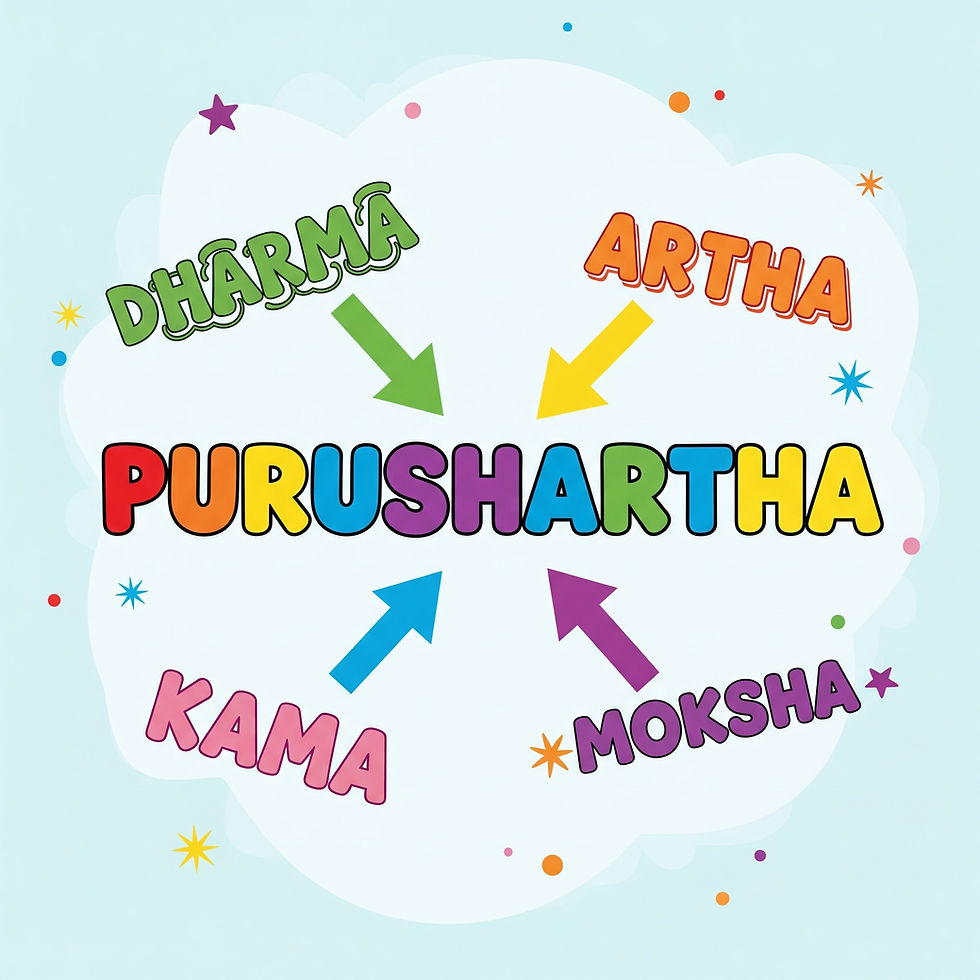The Four Purusharthas: Life Goals from Hindu Philosophy
- myNachiketa
- Aug 1, 2025
- 3 min read

Once upon a time, in a land filled with the enchanting tales of ancient India, there lived wise sages and vibrant personalities who dedicated their lives to exploring the purpose of human existence. They pondered and shared invaluable wisdom about achieving a fulfilling and balanced life. This delightful journey introduces us to the concept of the Four Purusharthas, the essential life goals that help us grow and understand our purpose.
What are Purusharthas?
The word Purushartha is made up of two words: ‘Purusha’, which means human or person, and ‘Artha’, which signifies goal or purpose. Together, they refer to the four main goals of life that guide us on our journey.
myNachiketa presents Four Purusharthas: The Life Goals from Hindu philosophy.
The Four Purusharthas are:
Dharma: Righteousness and duty
Artha: Prosperity and wealth
Kama: Desires and pleasures
Moksha: Liberation and spiritual freedom
1. Dharma: Righteousness and Duty
Imagine being a hero in a storybook. The hero doesn't just act for themselves, but also takes care of others and fights for what is right. This is what Dharma is all about! It’s our duty to live rightly and treat others with respect and kindness.
In the Bhagavad Gita, Krishna teaches Arjuna that fulfilling one's duty, no matter how difficult it seems, leads to a meaningful life.

Let's think about this in our daily lives:
Example: If you see someone being bullied at school, your Dharma may be to stand up for them, help them, and be a good friend.
Importance: When we follow Dharma, we create harmony in our lives and positively impact those around us.
2. Artha: Prosperity and Wealth
Artha is about prosperity and achieving success. It helps in understanding how to earn a living and use resources wisely. Having the means to support ourselves and our loved ones is important. In the ancient texts, Artha is seen as a necessary goal to contribute positively to society.

Example: If you take care of your pocket money by saving for something you really want rather than spending it all on candies and toys, you are practising Artha.
Importance: Earning money and resources wisely helps us turn our dreams into reality and assists others in need.
3. Kama: Desires and Pleasures
Doesn’t a delicious scoop of ice cream or the fun of playing with friends bring a smile to your face? Kama encompasses all the good things we enjoy in life, like dancing, listening to music, watching our favourite show and having a good time with friends. We should enjoy the pleasures of life, but without hurting others and avoiding our duties.

Example: You can enjoy reading your favourite books or playing your favourite games. But remember, spending too much time on the phone or tablets can distract you from your studies or family!
Importance: By balancing our desires, we learn to appreciate what life offers while also being responsible.
Buy our books to explore more inspiring stories and lessons for children
4. Moksha: Liberation and Spiritual Freedom
Moksha is like reaching the finish line of a long, exciting race, where we free ourselves from the cycle of birth and rebirth. Moksha or liberation is the journey of seeking inner peace and understanding our true selves. The Upanishads express this ultimate goal where one realises their unity with the universe.

Example: Think about the calm and joy you feel when you sit quietly and meditate or when you reflect on your actions. This resembles the path to Moksha.
Importance: Seeking Moksha helps us grow spiritually and encourages us to live harmoniously with ourselves, others, and the world.
Conclusion
The Four Purusharthas: Dharma, Artha, Kama, and Moksha are essential life goals that teach us the importance of living a balanced life, where we care for ourselves and contribute positively to those around us. As you go through life’s adventures, remember to embrace these goals, making your journey not just a destination but a fulfilling and enriching experience.
We must walk together on this path of life, supporting one another to reach our goals. Let us nurture Dharma, Artha, Kama, and Moksha in our hearts, and live a meaningful and purposeful life.

More such blogs
Resources





















Comments